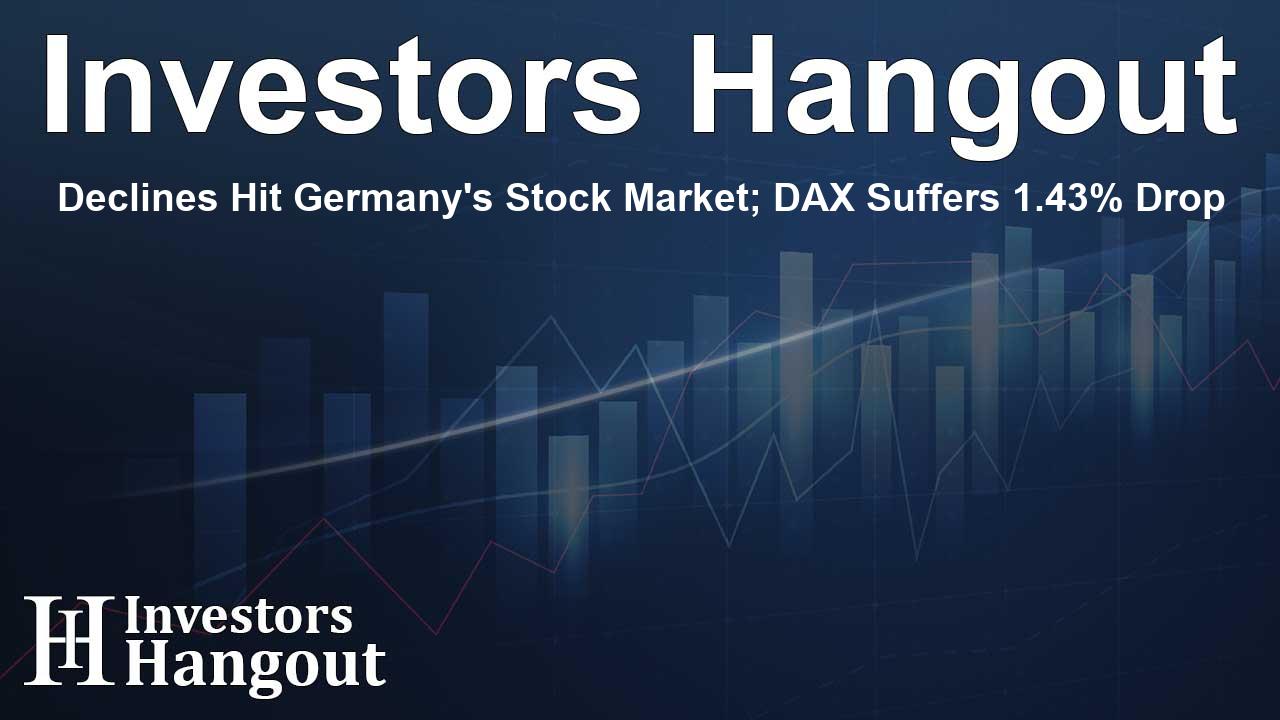Declines Hit Germany's Stock Market; DAX Suffers 1.43% Drop

Analysis of Germany's Stock Market Close
The German stock market faced a downturn, closing with losses across various sectors. The decline on Friday saw particularly underwhelming performance from the Technology, Transportation & Logistics, and Pharmaceuticals & Healthcare sectors, significantly impacting overall market sentiments.
Key Index Performances
At the conclusion of trading in Frankfurt, the DAX index was down 1.43%. In addition, the MDAX saw a decline of 1.54%, while the TecDAX index endured a larger dip of 2.27%. This broad downturn reflects growing concerns among investors about market stability.
Top Gainers Amidst Losses
Despite the overall negative trend, there were a few notable exceptions among the best performers on the DAX. Deutsche Boerse AG, for instance, managed to rise by 1.51%, closing at 208.20. MTU Aero Engines also displayed resilience, adding 0.80% to end the day at 278.50. Similarly, Siemens Energy AG saw a modest increase of 0.78% to close at 32.30.
Worst Performers of the Day
Conversely, the market also witnessed some significant declines. Sartorius AG took the hardest hit, falling 6.90% to close at 230.90. Mercedes Benz Group AG and Brenntag AG followed suit, dropping 6.81% and 5.91%, respectively, reflecting a challenging trading environment.
MDAX Performance Overview
Among the MDAX stocks, LEG Immobilien AG posted a slight gain of 0.17%, concluding the day at 92.16. However, other stocks struggled, with Puma SE dropping 6.47% to 35.27. It highlights the mixed bag of results within the index amid larger market disruptions.
TecDAX Highlights
The TecDAX also saw varied performances. Atoss Software AG was a standout, rising 1.25% to reach 129.80. Yet, significant declines were noted for some, such as Sartorius AG, with a notable 6.90% decrease, indicating ongoing volatility in tech sectors.
Market Sentiment and Trends
The prevailing sentiment on the Frankfurt Stock Exchange leaned heavily toward bearish as falling stocks outnumbered advancing ones by a ratio of 444 to 178. With 23 stocks remaining unchanged, the market's confidence seemed shaken. The fear factor could be attributed to numerous economic shifts affecting investor behavior.
Sector and Commodities Analysis
On the commodities front, gold futures for December delivery saw an uptick of 1.23%, indicating investor interest in safer assets. In contrast, crude oil prices dipped, showcasing the complex relationship between stock performance and commodity prices. With the November Brent oil contract falling by nearly 0.59%, it's clear that energy markets are also under pressure.
Currency Dynamics
In currency trading, the EUR/USD pair remained unchanged at 1.12. Such stability could indicate investor caution amidst broader uncertainties. Meanwhile, the US Dollar Index Futures marginally increased by 0.15% to reach 100.47, reflecting ongoing trends in the global currency market.
Conclusion
The current state of Germany's stock market certainly reflects a complex interplay of factors influencing investor sentiment. As markets close for the week, all eyes will remain on future trading sessions and potential rebounds or further declines. As insights unfold regarding the broader economic impacts, stakeholders will be keenly observing major indices, including the DAX, to gauge market health moving forward.
Frequently Asked Questions
What sectors contributed most to the decline in the DAX?
The Technology, Transportation & Logistics, and Pharmaceuticals & Healthcare sectors were the primary contributors to the decline in the DAX.
Which companies were the notable gainers in the DAX?
Notable gainers on the DAX included Deutsche Boerse AG, MTU Aero Engines, and Siemens Energy AG.
What were the closing numbers for key indices?
The DAX closed down 1.43%, MDAX fell 1.54%, and TecDAX lost 2.27%.
How did commodities perform during the trading session?
Gold futures rose by 1.23%, while crude oil prices saw minor declines.
What was the trading sentiment on the Frankfurt Stock Exchange?
The sentiment was predominantly bearish, with falling stocks outnumbering advancing ones by a significant margin.
About Investors Hangout
Investors Hangout is a leading online stock forum for financial discussion and learning, offering a wide range of free tools and resources. It draws in traders of all levels, who exchange market knowledge, investigate trading tactics, and keep an eye on industry developments in real time. Featuring financial articles, stock message boards, quotes, charts, company profiles, and live news updates. Through cooperative learning and a wealth of informational resources, it helps users from novices creating their first portfolios to experts honing their techniques. Join Investors Hangout today: https://investorshangout.com/
Disclaimer: The content of this article is solely for general informational purposes only; it does not represent legal, financial, or investment advice. Investors Hangout does not offer financial advice; the author is not a licensed financial advisor. Consult a qualified advisor before making any financial or investment decisions based on this article. The author's interpretation of publicly available data shapes the opinions presented here; as a result, they should not be taken as advice to purchase, sell, or hold any securities mentioned or any other investments. The author does not guarantee the accuracy, completeness, or timeliness of any material, providing it "as is." Information and market conditions may change; past performance is not indicative of future outcomes. If any of the material offered here is inaccurate, please contact us for corrections.